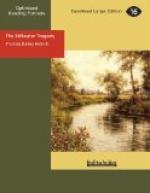A few minutes later, it being impossible to prolong the pretended quest for the drawings, Mr. Taggett was obliged to follow Mrs. Spooner from the apartment. As he did so he noticed a bright object lying on the corner of the mantel-shelf,—a small nickel-plated key. In order to take it he had only to reach out his hand in passing. It was, as Mr. Taggett had instantly surmised, the key of Richard’s workshop.
If it had been gold, instead of brass or iron, that bit of metal would have taken no additional value in Mr. Taggett’s eyes. On leaving Mrs. Spooner’s he held it tightly clasped in his fingers until he reached an unfrequented street, where he halted a moment in the shadow of a building to inspect the paper, which he had half forgotten in his satisfaction at having obtained the key. A stifled cry rose to Mr. Taggett’s lips as he glanced over the crumpled note-sheet.
It contained three lines, hastily scrawled in lead-pencil, requesting Richard Shackford to call at the house in Welch’s Court at eight o’clock on a certain Tuesday night. The note had been written, as the date showed, on the day preceding the Tuesday night in question—the night of the murder!
For a second or two Mr. Taggett stood paralyzed. Ten minutes afterwards a message in cipher was pulsing along the wires to New York, and before the sun went down that evening Richard Shackford was under the surveillance of the police.
The doubtful, unknown ground upon which Mr. Taggett had been floundering was now firm under his feet,—unexpected ground, but solid. Meeting Mary Hennessey in the street, on his way to the marble yard, Mr. Taggett no longer hesitated to accost her, and question her as to the story she had told William Durgin. The girl’s story was undoubtedly true, and as a piece of circumstantial evidence was only less important than the elder Shackford’s note. The two cousins had been for years on the worst of terms. At every step Mr. Taggett had found corroboration of Wollaston’s statement to that effect.
“Where were Coroner Whidden’s eyes and ears,” wrote Mr. Taggett,—the words were dashed down impatiently on the page, as if he had sworn a little internally while writing them,—“when he conducted that inquest! In all my experience there was never a thing so stupidly managed.”
A thorough and immediate examination of Richard Shackford’s private workshop was now so imperative that Mr. Taggett resolved to make it even if he had to do so under the authority of a search-warrant. But he desired as yet to avoid publicity.




